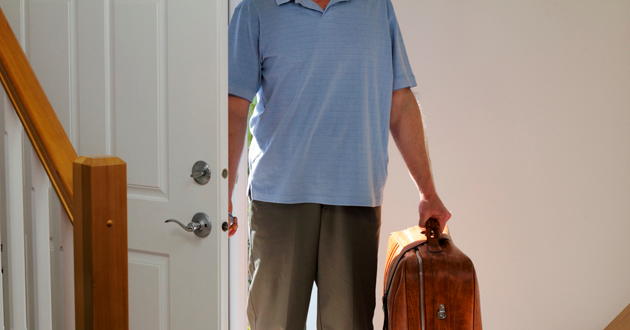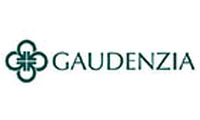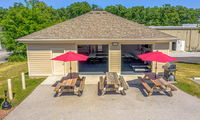Inpatient Addiction Treatment

More than 21.5 million people in the U.S. are struggling with substance use disorders but only 10% receive the help they need. Treatment programs can help you get sober and sustain long-term recovery. For many people, the first step is attending a residential treatment program where you can get structured support through your recovery.
What is Residential Rehab?
The primary goal of a residential rehab center is to help clients detox from the effects of drug and alcohol while in a safe environment. Treatment is often medically-supervised and includes counseling to help clients develop skills to stay sober.
At a residential rehabilitation center, also known as an inpatient facility, residents stay in a hospital or residential setting for group therapy, individual counseling and educational classes. The specifics of residential treatment programs may vary, but they typically include 24/7 support, medical services, group counseling, psychotherapy, case management, family programming and aftercare. Depending on the facility, alternative or holistic therapies like yoga, acupuncture or meditation may also be offered.
Residential treatment programs may include:
- Medically supervised detox and withdrawal services: Depending on the residential facility, medical support may be offered to those experiencing alcohol or drug withdrawal. Withdrawal symptoms can be severe and include painful physical and mental symptoms.
- Medication monitoring: Residential facilities are generally required to have medical and nursing staff available to help clients manage prescription medications.
- Group therapy: During group therapy, clients will challenge faulty thinking patterns, discuss past experiences and develop new skills to support a sober lifestyle moving forward – like relapse prevention or developing a sober support network.
- Individual counseling: Residential programs may require individual counseling sessions between clients and their primary counselor. These counseling sessions sometimes double as time for case management, where counselors will help clients process their time in treatment, create a treatment plan or process topics discussed in group.
- Psychotherapy: Individual counseling and case management hours may be separate from psychotherapy, which involve sessions with a trained mental health therapist. Clients may also have access to different types of counseling like cognitive behavioral therapy (CBT) to help process thoughts and develop new thinking patterns, or assistance in managing a formal mental health diagnosis.
- Family Support Programming: Many residential programs offer family support programming to help parents, children, couples or entire families. Addiction is often called the "family disease." Due to the nature of substance use disorder, dysfunctional family dynamics or family problems are common.
- Aftercare: No matter how you get sober, aftercare is an important part of the treatment process and can help prevent relapse. It can take time to fully transition back to daily life. Aftercare programming can include being recommended to stay at a sober living facility or complete an outpatient treatment program. Some residential facilities even have an alumni program with sober support, online resources or alumni events offered to help clients stay connected to their peers and treatment counselors.
Inpatient Rehabilitation vs. Outpatient
If you're ready to take the next step toward getting sober then you might be wondering what kind of rehab program is right for you—inpatient or outpatient?
Inpatient Treatment
An inpatient program like a residential rehab center will provide a treatment bed so you can stay overnight and immerse yourself in recovery. With round-the-clock support, residential programs offer medical services, psychotherapy, daily groups and family support programming. Clients recommended to inpatient treatment often need a higher level of care due to many factors like frequency of chemical use, history of substance use, mental health diagnoses or lack of a support network.
There are short-term and long-term residential programs. The most common type of residential facility is a short-term program, which usually lasts between 30-90 days. These programs focus on managing withdrawal and helping clients detox – also called medically-managed withdrawal. While attending a short-term residential program, clients will be in a highly structured environment and will learn skills and coping mechanisms to help them transition back into a community-based setting or an outpatient treatment program.
Long-term residential programs usually last between 6-12 months. In this type of program, the staff and fellow residents become a client's support system and use a long-term model of care to help the client find sustained recovery. Also known as therapeutic communities (TC), these programs focus on socializing clients to a sober lifestyle and are often structured with educational classes and employment skills training.
Outpatient Treatment
In an outpatient treatment program, clients do not live on-site at a treatment facility. Clients are able to attend group sessions throughout the week while also transitioning back into everyday life, including going to work, attending medical appointments and spending time with family or sober friends. In outpatient treatment, a healthy, sober living environment and strong support network can lead to greater success in staying sober and adopting a sober lifestyle.
Residential Alcohol Rehab
If you're struggling with alcoholism, a residential treatment program can often be the best option to help you get sober. In a society filled with alcohol-related marketing and alcoholic beverages available at most restaurants, getting sober might seem difficult, especially right away. With an inpatient treatment program, you can focus on getting sober without the pressures or challenges of the external world.
Residential treatment programs not only provide a sober living environment during your stay, they also provide round-the-clock support that will allow you to immerse yourself in the principles and practices of recovery. Residential programs for alcohol addiction will often focus on helping the body recover from the effects of alcohol abuse, as well as teaching skills like relapse prevention, coping strategies and how to form a sober support network.
Residential Drug Rehab
For people who have been using drugs for an extended period of time, or in large quantities, a residential treatment program can help provide the 'time out' needed to let the body detox. In an inpatient treatment program for drug addiction, clients will safely detox from substances and also work to develop new coping strategies and relapse prevention tools. This prepares them for an outpatient or community-based setting. The outcomes of sustained recovery can be much higher when a residential program for drug use is followed by an aftercare plan – like community support programs (AA, NA, SMART Recovery) or an outpatient treatment program.
Inpatient Dual Diagnosis Treatment Facilities
If you have a mental health diagnosis like bipolar disorder, depression, anxiety, borderline personality disorder or a traumatic brain injury (TBI), a dual diagnosis residential treatment program may be right for you. These specialized, residential facilities provide treatment for co-occurring disorders. In addition to traditional treatment programming, expanded groups or classes may be available, such as:
- Cognitive behavioral therapy (CBT)
- Dialectical behavioral therapy (DBT)
- Trauma-informed counseling
- Groups for individuals with brain injuries
- Psychotherapy
- Cost of residential/inpatient rehab centers
The cost of a residential treatment program will vary depending on your length of stay, the facility's amenities, type of programming and your insurance coverage. Some residential treatment programs are covered by insurance or by a state's consolidated fund, while others require either a partial or full out-of-pocket payment. Residential treatment programs can range anywhere from $5,000 to more than $20,000 for a luxury treatment program. Don't let the cost deter you from getting help – you can contact residential treatment facilities for exact cost information and to organize a payment option that works for you.
How to Choose a Residential/Inpatient Rehab Center
Every person is unique, and every addiction disorder is unique, so it's important to choose a program that's right for you. Here's how to get started:
-
Contact a treatment provider near you: Look for a treatment center or mental health provider near you and talk with them about your interest in getting sober. They can help you find a treatment center or answer questions about their program to ease your worries and let you know what to expect.
-
Set a time for an evaluation or assessment: Completing a residential treatment program will start with setting up a chemical use evaluation or assessment. The assessment will go through your comprehensive health history and your history with drugs and alcohol to help a treatment center learn more about you and your recovery goals.
-
Find an open bed: After completing a chemical use assessment, you'll likely be put in contact with a treatment center's admissions department. They will ask questions about your insurance, funding options and can tell you if they have treatment beds available. If no open slots are available then you’ll usually have the option to be put on a waitlist.
Sometimes getting started is the hardest part. Researching rehab facilities and learning about the program options available to you is a fantastic beginning to your recovery. Remember to have hope and courage for the things to come. Recovery isn't easy, but it's worth it.










